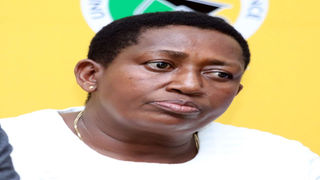
Businesswoman Mary Wambui. The EACC says it is investigating loss of taxpayers’ funds at KNTC in an inquiry that will ensnare KCB Group and Ms Wambui.
| File | Nation Media Group.News
Premium
Businesswoman Mary Wambui on EACC radar over Sh22bn food imports
What you need to know:
- Outcome of 2022 election triggered rewards to individuals who remained loyal to Kenya Kwanza.
- KRA issued an exemption on duty to KNTC for the importation of hundreds of thousands of tonnes of foodstuffs.
- The anti-graft commission in investigating lucrative deals for the purchase of rice, beans and cooking oil by a State agency in a probe that will entangle prominent figures and shine a spotlight on ‘tenderpreneurs’ of the Kenya Kwanza administration.
The anti-corruption agency has launched investigation into the recent purchase of rice, beans and cooking oil by companies contracted by the Kenya National Trading Corporation (KNTC).
There are fears the investigation could touch President William Ruto’s allies and shine a spotlight on the “tenderpreneurs” of the Kenya Kwanza administration.
The Ethics and Anti-Corruption Commission (EACC) has formally demanded 25 sets of files from KNTC, related to the imports, the first step in what could become a wide investigation of the state agency.
The EACC says it is investigating loss of taxpayers’ funds at KNTC in an inquiry that will ensnare KCB Group and businesswoman Mary Wambui.
The KNTC has become a mint for well-connected individuals and companies with contacts in trading capitals like Dubai, doling out Sh22 billion deals in the six months to April.
Also Read: Mixed results for tax waiver on food imports
This has seen it rise from annual dealings of under Sh1 billion two years ago to a multi-billion shilling cash machine riding on Sh24 billion backing from KCB for the importation of food.
It makes it the most expansive state-sponsored duty-free import regime.
At the centre of the investigation are nine companies that KNTC contracted to import commodities as part of President Ruto’s plans to reduce the cost of food and ultimately lower inflation.
The nine companies were awarded contracts to ship in rice, beans, cooking oil and fertiliser without going through competitive bidding.
Four of the companies – Purma Holdings, Charma Holdings Ltd, Enterprise Supplies Ltd and Evertec General Trading – are linked to Ms Wambui.
They shipped in edible oil, rice and beans in deals valued at more than Sh6 billion.
The others are Dubai registered Multi Commerce FZC and Lone Trading FZE while local companies – Standard Petroleum, Makram Imports and Exports Ltd and Shehena Commodity Ltd – complete up the list.
“The commission is investigating allegations of corruption and embezzlement of public funds at KNTC through irregular award of tenders for the supply and delivery of food commodities during the 2022/23 and 2023/24 financial years,” an October 17 letter to KNTC Managing director Pamela Mutua says.
“To facilitate the investigation, kindly provide us with the original documents listed below in relation to procurement of the commodities.”
The EACC is demanding KNTC Board minutes and approved budget supporting the purchase of the food and fertiliser on food.
It wants evidence of advertising for the tenders, tendering files and evaluation of the bids.
The investigation follows complaints that the contracts were dished out to favoured entities.
The commission is seeking letters of notification to the successful and unsuccessful bidders as well as a notice to enter into a contract with the winning bidders.
It also wants contract agreements.
However, the EACC is not likely to get the documents.
Months ago, immediate former Trade Cabinet Secretary Moses Kuria informed the Senate that the Public Procurement Regulatory Authority allowed KNTC to buy rice, beans, cooking oil and fertiliser directly from companies without tendering.
He based the exemption, which was issued on November 18, on the fact that KNTC was buying the food for trading and not for internal use or consumption.
“Transactions for trading items are progressed outside the public procurement and assets disposal law, with proper financing and accounting procedures put in place,” Mr Kuria told the Senate on June 21.
EACC is also seeking invoices and delivery notes to confirm that the food landed in KNTC stores.
It wants to be furnished with bank accounts of the nine companies and the credit financing agreements between KCB Group and KNTC.
KNTC had secured a letter of credit – a guarantee that a seller would get a buyer’s payment on time – from KCB to support the imports on duty-free basis.

Firms owned by Kenya Kwanza-linked honchos have won multi-billion-shillings contracts, but some crucial details are not in the state portal.
Under letters of credit, the state is to pay the suppliers later after recovering cash from the corner shops, avoiding the need for upfront payment by KNTC.
Promoters of the deal mapped 120,000 retail shops where the cheap imported food would be stocked as the government targeted to ease the cost of living that pushed inflation to 9.2 per cent in February.
KCB was expected to earn from offering letters of credit or offering comfort to suppliers.
Now, EACC wants sales and revenue reports from KNTC as evidence that the food is being sold through the 120, 000 corner shops.
The Kenya Revenue Authority issued an exemption on duty to KNTC for the importation of 125,000 tonnes of cooking oil, 175,000 tonnes of rice, 80,000 tonnes of beans and 200,000 tonnes of sugar.
The outcome of the August 2022 General Election triggered rewards to individuals who stuck by President Ruto during the gruelling campaigns.
Things could not have gone better for Ms Wambui.
The Office of the Director of Public Prosecutions has dropped tax evasion charges against her and she was tapped as the chairperson of the Communication Authority of Kenya.
Her companies are also raking in billions of shillings in government contracts.
Purma Holdings got a contract to deliver 30,000 tonnes of rice, 20,000 tonnes of beans and 12,500 tonnes of edible oil to the KNTC.
Business Registration Service (BRS) records show the company was incorporated on February 13, 1996.
Ms Wambui is the sole proprietor, with 1,300 shares.
Documents seen by the Nation show that KNTC bought a 20-litre can of cooking oil for $26 (Sh3, 647 in May). The contractors buy a at $20 (Sh2,806).
The 12,500 tonnes of cooking oil equates to about 702,000 jerrycans.
It means Ms Wambui’s Purma Holdings will sell oil for $18.2 million (Sh2.5 billion). Of this, $4.2 million (Sh589 million) will be Purma’s profit, excluding taxes and expenses like shipping.
Charma Holdings Ltd was contracted to import 535,950 jerrycans of cooking oil and 20,000 tonnes of red kidney beans.
The firm was incorporated on July 31, 2007. Ms Ruth Waithira Kinyanjui, an associate of Ms Wambui, is listed as the sole shareholder.

A Kenya National Trading Corporation technician demonstrates how a cooking oil dispensing machine, dubbed ‘Mama Pima’, works at the DCC office in Kawangware in Dagoretti South constituency, Nairobi, on August 21, 2023
Ms Kinyanjui is Charma Holdings’ co-owner, along with Ms Wambui’s daughter Evelyn Nyambura Mungai, who is associated with Nightingale Enterprises – another company doing business with the government.
Ms Kinyanjui’s postal address on the BRS ownership records of Charma Holdings is the same as Ms Wambui’s personal postal address on other official government documents.
Charma Holdings sold $13.9 million (Sh1.95 billion) cooking oil to KNTC. The company will earn $3.2 million (Sh451 million) after taxes and expenses.
Mr Kuria told senators that Enterprise Supplies Ltd would sell 6,250 tonnes of cooking oil to KNTC, estimated to be valued at $9.1 million (Sh1.2 billion).
Ms Wambui is listed as the sole shareholder of Enterprise Supplies, with 550 shares. It was incorporated on January 13, 2010.
In another contract, Evertec General Trading Company Ltd is to supply 6,250 tonnes of cooking oil to KNTC.
Evertec was incorporated on April 10, 2008. Mr George Maina Wanjohi is listed as the sole shareholder.
Ms Kinyanjui, the sole shareholder of Charma Holdings, is listed as the contact person for Evertec. Her contact details are listed in Evertec’s ownership records.
When the DPP’s office sought to withdraw tax evasion charges against Ms Wambui, her daughter Purity Njoki, Purma Holdings and Evertec were mentioned in court proceedings.
Standard Petroleum Ltd is listed as unaudited in the BRS.
This means the company has not complied with the requirements for firms to declare their shareholding and directorship details to the Companies Registry. As a result, its ownership records are not available.
Also Read: Why cost of ugali may not drop drastically
In his responses to the Senate, Mr Kuria provided a document indicating that the company is listed as unverified.
That means KNTC and the ministry may not know who owns Standard Petroleum Ltd.
The company has a contract to sell 12,500 tonnes each of beans, rice and oil.
Makram is to sell 25,000 tonnes of rice to KNTC.
The company was established on April 27, 2021. Mr Abdirahman Muhumed Kainan is listed as the sole shareholder with 100 shares.
Makram was just over a year old when it was approached by KNTC for the rice contract.





